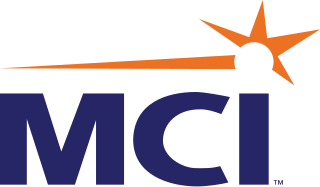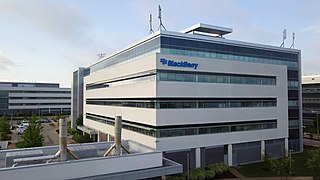
Advanced Mobile Phone System (AMPS) was an analog mobile phone system standard originally developed by Bell Labs and later modified in a cooperative effort between Bell Labs and Motorola. It was officially introduced in the Americas on October 13, 1983, and was deployed in many other countries too, including Israel in 1986, Australia in 1987, Singapore in 1988, and Pakistan in 1990. It was the primary analog mobile phone system in North America through the 1980s and into the 2000s. As of February 18, 2008, carriers in the United States were no longer required to support AMPS and companies such as AT&T and Verizon Communications have discontinued this service permanently. AMPS was discontinued in Australia in September 2000, in Pakistan by October 2004, in Israel by January 2010, and Brazil by 2010.
Motorola, Inc. was an American multinational telecommunications company based in Schaumburg, Illinois, United States. After having lost $4.3 billion from 2007 to 2009, the company split into two independent public companies, Motorola Mobility and Motorola Solutions on January 4, 2011. Motorola Solutions is the legal successor to Motorola, Inc., as the reorganization was structured with Motorola Mobility being spun off. Motorola Mobility was acquired by Lenovo in 2014.

3Com Corporation was an American digital electronics manufacturer best known for its computer network products. The company was co-founded in 1979 by Robert Metcalfe, Howard Charney and others. Bill Krause joined as President in 1981. Metcalfe explained the name 3Com was a contraction of "Computer Communication Compatibility", with its focus on Ethernet technology that he had co-invented, which enabled the networking of computers.
Iridium Communications Inc. is a publicly traded American company headquartered in McLean, Virginia. Iridium operates the Iridium satellite constellation, a system of 66 active satellites used for worldwide voice and data communication from hand-held satellite phones and other transceiver units. The nearly polar orbit and communication between satellites via inter-satellite links provide global service availability.

MCI Communications Corp. was a telecommunications company headquartered in Washington, D.C. that was at one point the second-largest long-distance provider in the United States.

A pager is a wireless telecommunications device that receives and displays alphanumeric or voice messages. One-way pagers can only receive messages, while response pagers and two-way pagers can also acknowledge, reply to and originate messages using an internal transmitter.

UUNET, founded in 1987, was one of the largest Internet service providers and one of the early Tier 1 networks. It was based in Northern Virginia and was one of the first commercial Internet service providers. Today, UUNET is an internal brand of Verizon Business.

BlackBerry Limited is a Canadian software company specializing in cybersecurity. Founded in 1984, it was originally known as Research In Motion (RIM). As RIM, it developed the BlackBerry brand of interactive pagers, smartphones, and tablets. It transitioned to a cybersecurity enterprise software and services company under Chief Executive Officer John S. Chen. Its products are used by various businesses, car manufacturers, and government agencies to prevent hacking and ransomware attacks. They include BlackBerry Cylance's artificial intelligence based cyber-security solutions, the BlackBerry AtHoc emergency communication system (ECS) platform; the QNX real-time operating system; and BlackBerry Enterprise Server, a Unified Endpoint Management (UEM) platform.

AT&T Mobility LLC, also known as AT&T Wireless and marketed as simply AT&T, is an American telecommunications company. It is a wholly owned subsidiary of AT&T Inc. and provides wireless services in the United States. AT&T Mobility is the third-largest wireless carrier in the United States, with 101.6 million subscribers as of the end of Q1 2022.
AT&T Wireless Services, formerly part of AT&T Corp., was a wireless telephone carrier founded in 1987 in the United States, based in Redmond, Washington, and later traded on the New York Stock Exchange under the stock symbol "AWE", as a separate entity from its former parent.

Alltel Wireless was a wireless service provider, primarily based in the United States. Before acquisitions by Verizon Wireless and AT&T, it served 34 states and had approximately 13 million subscribers. As a regulatory condition of the acquisition by Verizon, a small portion of Alltel was spun off and continued to operate under the same name in six states, mostly in rural areas. Following the merger, Alltel remained the ninth largest wireless telecommunications company in the United States, with approximately 800,000 customers. On January 22, 2013, AT&T announced they were acquiring what remained of Alltel from Atlantic Tele-Network for $780 million in cash.
Telus Mobility is a Canadian wireless network operator and a division of Telus Communications which sells wireless services in Canada on its numerous networks. It operates 5G, LTE and HSPA+ on its mainstream networks. Telus Mobility is the second-largest wireless carrier in Canada, with 10.6 million subscribers as of Q3 2020.

Sprint Corporation was an American telecommunications company. Before it merged with T-Mobile US on April 1, 2020, it was the fourth-largest mobile network operator in the United States, serving 54.3 million customers as of June 30, 2019. The company also offered wireless voice, messaging, and broadband services through its various subsidiaries under the Boost Mobile and Open Mobile brands and wholesale access to its wireless networks to mobile virtual network operators.
Motorola Solutions, Inc., is an American video equipment, telecommunications equipment, software, systems and services provider that succeeded Motorola, Inc., following the spinoff of the mobile phone division into Motorola Mobility in 2011. The company is headquartered in Chicago, Illinois.
DataTAC is a wireless data network technology originally developed by Mobile Data International which was later acquired by Motorola and deployed in the United States as the ARDIS network. DataTAC was also marketed in the mid-1990s as MobileData by Telecom Australia, and is still used by Bell Mobility as a paging network in Canada. The first public open and mobile data network using MDI DataTAC was found in Hong Kong as Hutchison Mobile Data Limited, where public end-to-end data services are provided for enterprises, FedEx, and consumer mobile information services were also offered called MobileQuotes with financial information, news, telebetting and stock data.
Motorola Mobility LLC, marketed as Motorola, is an American consumer electronics manufacturer primarily producing smartphones and other mobile devices running Android. It is a subsidiary of the Chinese multinational technology company Lenovo.
Leap Wireless International, Inc. was a telecommunications operator that provided wireless services to approximately 4.6 million subscribers, the 5th largest, through its subsidiary, Cricket Communications, Inc.. It was headquartered in San Diego, California. Leap Wireless and Cricket Wireless are now subsidiaries of AT&T.

Symbol Technologies is an American manufacturer and supplier of mobile data capture and delivery equipment. The company specializes in barcode scanners, mobile computers, RFID systems and Wireless LAN infrastructure. In 2014, Symbol Technologies became a subsidiary of Zebra Technologies, and is headquartered in Holtsville, New York, on Long Island.

Nextel Communications, Inc. was an American wireless service operator that merged with and ceased to exist as a subsidiary of Sprint Corporation, which would later be bought by T-Mobile US and folded into that company. Nextel in Brazil, and formerly in Argentina, Chile, Peru, the Philippines, and Mexico, is part of NII Holdings, a stand-alone, publicly traded company not owned by Sprint Corporation.

Moto X is an Android smartphone developed and manufactured by Motorola Mobility, and released in August 2013.











